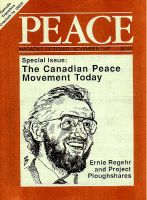
Peace Magazine Oct-Nov 1987, page 25. Some rights reserved.
Search for other articles by Simon Rosenblum here
Search for other articles by Fergus Watt here
A campaign by Canadian non-governmental organizations will educate the public and the candidates on the global issues of development. peace, and environment during the next federal election.
As the year 2000 approaches, our planet is threatened with severe crises:
And as bad as the situation is at present, the future looks much worse. There is an old saying: Much will have to change if things are just to remain the same.
An inequitable international economic system is a source of conflict and of environmental mismanagement (e.g. soil erosion, deforestation and contamination of water). Development is imperiled by militarism that cannot deliver the security it promises. Escalating military expenditures divert resources from environmental and social development, Environmental degradation is both a contributing cause of wars and a result of wars in the Third World. Thus a vicious circle is in motion. To pay for arms imports, Third World countries overexploit their resource base and promote export oriented agriculture. Environmental standards are disregarded and peasants are forced to squeeze everything they can out of their environment, often resulting in deforestation and desertification. As now in Africa, such environmental destruction is worsened by war and creates environmental refugees.
International aid must be improved, the global economy reformed, global militarization reduced, the planet's ecology stabilized. It is impossible to consider any of these problems in isolation. The issues are interconnected and require coordinated global action. Voters in the next federal election must elect candidates with a global perspective.
Many of these issues require long-term planning and political action. Our political structures do not respond well to problems that require coordinated action over a long period. Too often our response is to manage crises alter the act, rather than to plan measures to prevent these problems before they get Out of hand. Too much of our development effort is taken up by emergency food aid, without sufficient attention being devoted to meeting basic needs. Environmental budgets are spent on cleanups of polluted areas, while insufficient resources are devoted to monitoring the environment and factoring environmental considerations into industrial strategies and development planning. And present diplomacy is consumed more with efforts to stabilize accelerating arms races, rather than bringing about genuine arms reductions and international agreements for the peaceful settlement of international disputes. An interdependent world requires politicians who understand the fragility of our planet and our obligations to others.
Election Priorities 88/89 will be collectively run by its participants. Representatives from each of the disarmament, environment, and development movements presently constitute the Project Committee. The Canadian Council for International Cooperation (an umbrella organization of non-governmental organizations) has agreed to be the "administrative base" for the campaign. Special attention is being paid to maintaining close communications with all participants and incorporating their suggestions into the project design and operation.
Educational Resources-Resource kits will provide:
Implementation of Elections Priorities 88/89 will be carried out during the election campaign by committees in federal ridings. These committees will survey local candidates and develop strategies for involving their community in this electoral and educational process. The Elections Priorities national committee will assist in linking interested parties in each riding.
The CPA's election campaign has a strong nuclear weapons orientation. Given the implications of a nuclear war and a desire to give a campaign a definable focus, we can easily understand their choice. Yet the dangers of nuclear war do not exist in a vacuum. Global militarization and poverty, along with regional conflicts, result from environmental degradation. These are the settings for military conflict which could escalate into nuclear war. A concerted effort was made to have the Election Priorities 88/89 focus incorporated into the CPA's campaign -- if only as a supplement, Unfortunately. the necessary two-thirds support amongst CPA members for this "merger" was not obtained and the two campaigns will have to work side by side, All concerned, however, intend that the two projects cooperate, so that neither steps on the other's toes. In many communities, both organizations will, in fact, work on both initiatives.
We hope you will carefully consider this project and become involved in forming riding committees, selecting appropriate questions, and preparing training workshops. Contact Election Priorities 88/89 at 200 Isabella Street, Suite 300, Ottawa, Ontario.
Fergus Watt, a veteran soccer player, is Executive Director of the World Federalists of Canada. Simon Rosenblum, an aspiring tennis player, is Project Ploughshares Political Affairs Coordinator. Due to sub-par summer performances, neither of them qualifies for membership in Athletes for Social Responsibility.

Peace Magazine Oct-Nov 1987, page 25. Some rights reserved.
Search for other articles by Simon Rosenblum here
Search for other articles by Fergus Watt here